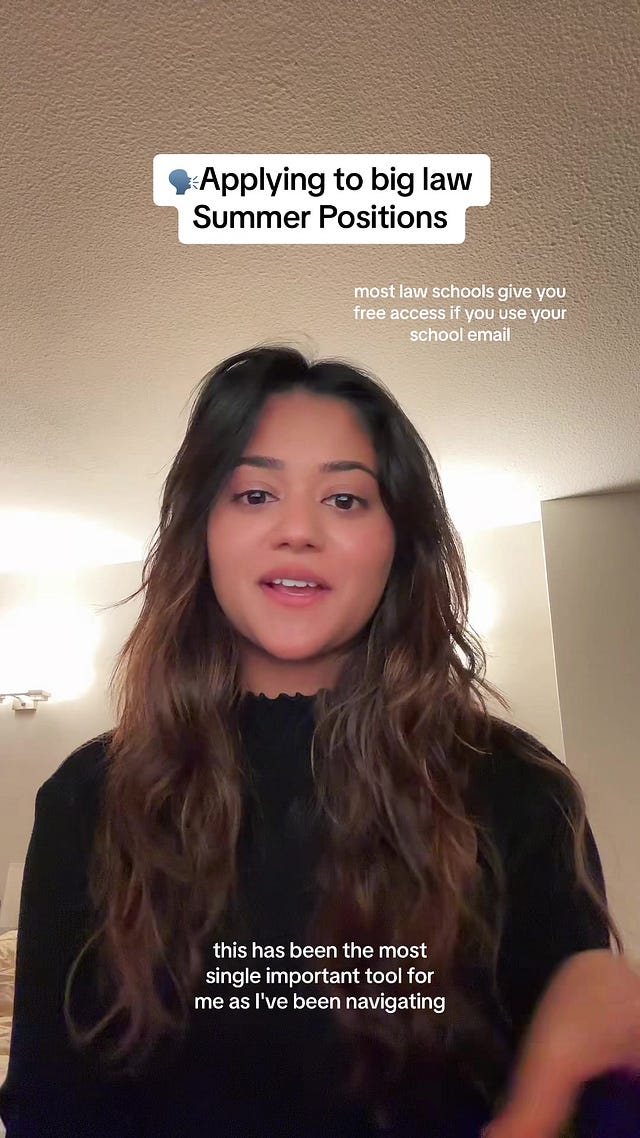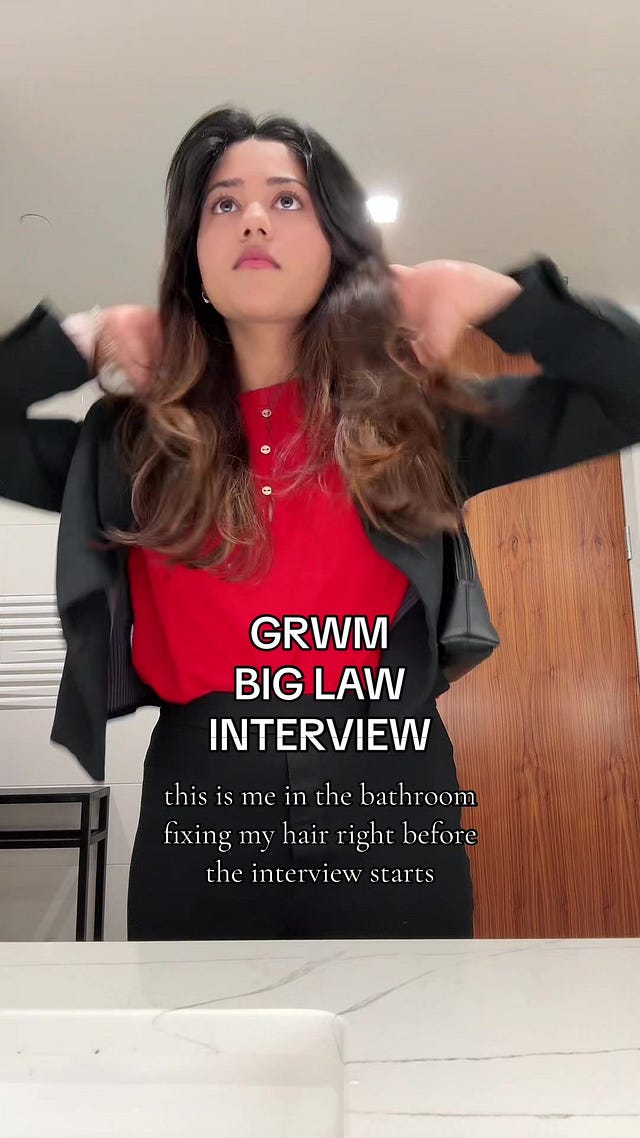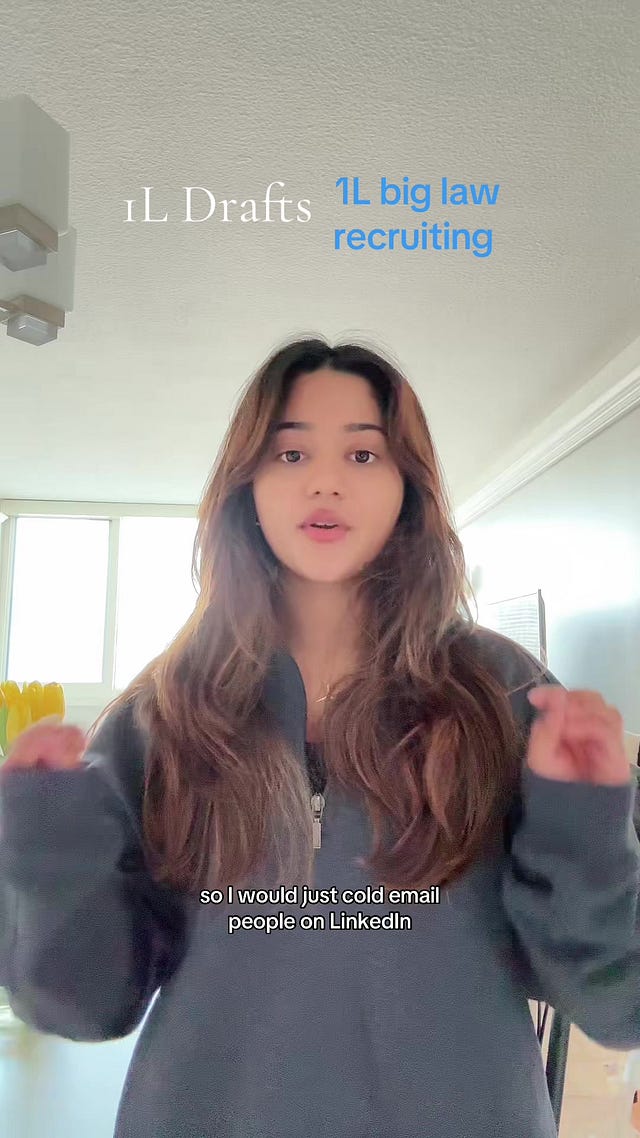Where I’m At
Geographically, I’m on a train from Geneva to Lyon. Temporally, it’s the last week of a long summer break, spanning over three months now. I couldn’t feel further from law school.
But time makes the heart grow fonder, and I’m genuinely excited to be a 2L. One reassurance fuels my growing nostalgia: 1L is over.
My first year of law school was one of my most difficult years both academically and professionally. Alongside preparing for class and studying for exams, I went through recruiting season for both 1L and 2L summer in a six-month span. And by the way, firm recruiting is no joke — imagine law school admissions on steroids.
But I’m on the other side now.
When things get hard, I can lean on the security I’ve waited for my entire adult life for:
I have a full-time job as an attorney waiting for me.
Okay yes, I have to receive a return offer first. But I’ve walked the halls of my future firm, talked to my future colleagues, and even ordered chai at my future go-to cafe. I’m counting my eggs.
Major Caveat: The post ahead pertains to big law recruiting. I applied to, and was offered, a position from one federal government position in D.C. If anyone is interested in hearing about that process and what differences, if any, I encountered, let me know in the comments.
This post is also embedded with my TikToks because I hope they will augment your understanding. If nothing else, check out the very first video (tutorial on using Firm Prospects).
101 on 1L Recruiting
Before I get ahead of myself and dish on 2L recruiting, let me cover the basics by walking you through my 1L recruiting timeline.
Timeline
These steps are listed in numerical order but the sequence varies. Sometimes, you’ll network for a position before you formally apply. You may also be interviewing for one position while wrapping up your application for others. You get the gist.
1. Applying
After having what I fondly refer to as a "rot week" post-finals, I wrote down a list of firms. The number began at 50. Then, a 3L told me to apply to 100. He told me “1l jobs are few and far between.” Feeling burned from the unpredictability of finals at that point, I decided to full send my job applications. I tapped out at 75, but 75 is still a lot.
I spent a few weeks obsessing. My family has a video of me post-wisdom teeth surgery coming home all loopy and begging to see my laptop because I needed to “respond to two people on LinkedIn.” Thank god they laughed and kept my devices far away.
The basic components:
An application form. Some applications accurately auto-populate the form with your resume. Others are a hot mess.
Resume. There are specific conventions for law firm resumes. Work with your career center.
Cover Letter. Personalize for higher priority firms. Do not submit a cover letter with another firm’s name.
Transcript. Unofficial PDF works.
Some positions may also require:
Writing Sample. You can tweak your Legal Writing Memo. Make sure to add a cover page explaining what the document was prepared for. Talk about this with your career services as well.
Personal Statement / Fellowship Essay / Diversity Statement. This is like a law school admissions diversity statement. It will need to be slightly tailored to each firm. Also, each firm has different word limit expectations for this essay. I had three versions: “short,” “medium,” and “long.”
Undergraduate Transcript. Unofficial PDF works.
References List. The application will require you to list up to three references. At least one should be a law school professor.
2. Networking
Get in Touch
Start with 2Ls or 3Ls that summered at the firm. You can reach out to your career services for a directory.
Cold message on LinkedIn.
Firm prospects (love this tool). Here’s a video on how to use it:
Tiktok failed to load.
Enable 3rd party cookies or use another browserSend a short message. Expect a <50% response rate.
The Call
Ask for 15 minutes of their time to hop on a call. Emphasize you’re interested in their firm and would love to learn more about their experience.
Be polite: Don’t show up late, reschedule more than once, or cut them off. Be cautious about mentioning other firms.
If all goes well, the contacts will let the recruiter know you reached out.
The Follow-Up
Bonus points: Send a thank you note after the conversation, especially if you really hit it off.
Keep them in the loop. If you end up with an interview or offer, send a quick message to let them know.
If you end up at the firm, this contact may end up as your assigned mentor or be the first to take you out to lunch!
BONUS: Go to “Home for the Holidays” Events
Offices recruiting 1Ls often have “Home for the Holidays” events. Arizona unfortunately has a pretty minimal big law presence. I took a two-day trip out to California and stayed with my cousins to visit two firms. It was my first time at a networking law firm event, and I genuinely had an amazing time. One of them ended up inviting me for a callback, and they were the firm I ultimately chose!
The Home for the Holidays events are typically in major cities and the travel/accommodations will not be reimbursed. However, as in my case, you often skip the screener interview if you make a good impression. It shows real dedication to show up to one. Still, I would not change up existing winter plans or spend an outrageous amount to attend these.
3. Interviews
The truth is, I didn’t hear back from the vast majority of places I heard from. But out of the ones I had interviewed with, I either withdrew my application or ended up with an offer!
General interview tips:
Feel comfortable taking a breath and letting a beat pass before answering a question.
Avoid swaying or fidgeting. It’s very noticeable even in virtual interviews.
Have strong WiFi and be in a quiet location with an appropriate background.
Dress in professional clothes. I always toss on a blazer.
Each response should be a story. Keep it tight and focused. Avoid rambling (here, I struggle). Strive for compelling.
Prep stories to the most common questions. These general stories can be repurposed to answer almost any interview question you’ll get thrown.
If you put an interests section on your resume (recommended), be prepared to talk about it.
Research the interviewer beforehand and try to squeeze in a specific career question.
Email a thank you note post-interview.
Screener
First, you will usually be asked to complete a virtual screener with a recruiter to see if you are a high-level match. Be able to articulate why you are interested in the firm. This is a great time to bring up conversations you may have had with attorneys at the firm.
If you already met the recruiter or attended a networking event, you may be directly invited to a second-round interview.
Second-Round Interviews
Second-round interviews can be between two to six hours. The interview is usually divided into 15-30-minute slots with one or multiple attorneys in each session. I did these interviews both in-person and virtually.
You will be asked “Tell me about yourself” many times. Here is my response formula:
Answer “Why law.” Just like your law school personal statement.
If you can, talk about specific practice area interests and tie them to professional or academic experiences.
Finally, try to tie it back to your interest in the specific firm.
Especially if you are traveling, these second-round interviews can be intense. Take care of yourself before and after. Pack a comfortable, professional outfit. Bring a backup.
4. Making a Decision
First Look: Before saying yes, visit the firm. Email the recruiting contact and ask if you can have a “first look.” They will fly you out and reimburse you for accommodations. It's important to make sure you get that “aha” moment. However, I personally would not do this if I already visited for my interviews (especially considering this will be happening during the semester).
If your dream firm gives you an offer, say yes and don’t look back.
But for the rest of us (I didn’t have a dream firm), be warned — this isn’t law school admissions. If given an offer, you have 14 days to accept or decline. You can request a two-day extension, especially if you’re waiting to visit the firm, but you most likely cannot wait for your entire cycle to unfold.
You can, and should, email firms you’d pick over the offer letting them know you have a hard deadline. This will accelerate their evaluation of their candidacy and if they don’t get to you by the deadline, that’s a red flag for them!
I got my first offer on a Friday. Somehow, that same day, I received two more offers. The next Monday, I said YES.
5. Post-decision Actions
Immediately withdraw your applications so your peers can hear back quicker. Here is a template message:
Dear XXX,
I wanted to express my appreciation for the opportunity to interview with your firm and meet with attorneys (CAN INCLUDE SPECIFIC NAMES HERE). After much consideration, I have made the difficult decision to accept another position this summer. I hope we can stay in touch and potentially explore opportunities in the future.
Best regards,
YYY
I got very lucky. Here’s what I think I did well.
I did not let my predictions of my 1L Fall grades hold me back from applying. I applied confidently, putting my best foot forward.
For the firms I was most interested in, I talked to either a Penn student who summered there or a current attorney at the office. I then referenced this connection in my cover letter and/or in my interview.
I applied to specific markets I had a strong connection to and a genuine desire to work in. Don’t be afraid to say your partner/cousins/family live there.
I took notes during all my conversations with students and attorneys. Every time I had a networking or interview call, I improved my networking skills.
Treat even networking calls like a screener interview.
Rejections may sting, but let it fuel you. Take the Ls as practice rounds. Now that I have a better understanding of how the meat gets packed, firm recruiting can be truly unpredictable. They may have already had someone in mind for the position or they may be a specific practice group void they’re looking to fill.
Other Considerations
Factors that probably helped me: STEM background, women of color, demonstrated networking efforts.
But keep in mind, I knew people that got 1L big law firm positions, at firms even “higher-ranked” than mine with none of the above. It is possible to get a position no matter your background or experience. The most important factor, after your grades and law school, is demonstrated interest. Network, Network, Network.
Apply Early. I got on a call with a 3L in November who told me to start applying in early December. They got their offer call minutes after their first final. I’m sure that felt good. But that wasn’t my story and I’m okay with that.
I applied for one position in early December to meet the application deadline. Otherwise, I submitted my applications through the end of December to early January.
Looking back, I don’t feel bad about not applying earlier. I hate the idea of applying to firms during finals. Your grades are exponentially more important. That being said, don’t delay until February.
Keep a Firm Tracker spreadsheet. The sheet should contain a list of every firm you applied to, who you interviewed with, networking contacts, and conversation notes.
For organization purposes, also keep a folder of all your application documents to track what you submitted to each firm and re-read it to prepare for interviews.
If you would like to see my Firm Tracker template, let me know in the comments.
Why do a 1L Firm Job at all?
In my usual fashion, let’s make a pros/cons list.
Pros
It’s an excellent way to build connections with attorneys in a niche industry.
You learn what good writing looks like in the real world. Your LPS classes teach you the rules, but in the real world, lawyers often break the mold to write persuasively.
Cool clients. My first project was with a major client and it felt surreal to work on something outside hypo la la land.
You will likely get a return offer. If you absolutely love the firm and take their offer, you can skip 2L recruiting altogether!
The programs are fun. I made good friends and got to go kayaking with sharks, did a surf lesson, and went to nice restaurants.
Pay. This is an awkward topic, but compensation is part of having a job. Outside my tutoring/consulting, I’ve been working minimum wage jobs (many concurrently) since I was 14. By contrast, the summer pay is the prorated salary of a first-year associate (a lot). The first time I got paid, it felt unexpectedly strange, but it's an incredibly relieving feeling to sit down and make a financial plan, budget for the year, and invest.
Many firms also offer DEI positions. For the firm I ended up selecting for 1L, I was a diversity fellow. They usually come with a bonus. The application process is more intensive and requires a personal statement reminiscent of the law school admissions diversity statement.
Cons
If you’re working in big law after graduating, you may want to spend this summer doing something different.
Big law firm positions can be very time-consuming. Some other legal positions may offer more flexibility. They may be fully remote or part-time research opportunities. As a summer associate, I pulled a few more late nights than expected.
This is an extremely minor point, but you will be asked why you’re not returning to your 1L firm in your 2L recruiting process. I did not speak poorly of my 1L firm but pivoted towards why I thought the interviewing firm stood out. It takes addressing with some finesse.
For me, trying for a 1L firm position was a no-brainer. I spent previous summers researching, writing, and volunteering. One thing I’ve somehow evaded — despite having like 20 part-time gigs — is a real 9- 5 corporate job. Plus, working at a law firm gave me a taste of intellectual property law work.
What’s to Come
I have a lot to catch you up on and it wouldn’t feel right to pick up my story without going back in time. Over the next few weeks, expect more posts than usual. I plan to debrief the following: my spring semester, spring finals, 1L summer firm experience, and 2L recruiting. Whew. It was a busy few months, and I’ve learned a lot. I hope this helps some of you out there.
It’s week 52. If made it a full year, you will too.








Hi! Where do you find out which firms offer 1L summer associate programs in your city?